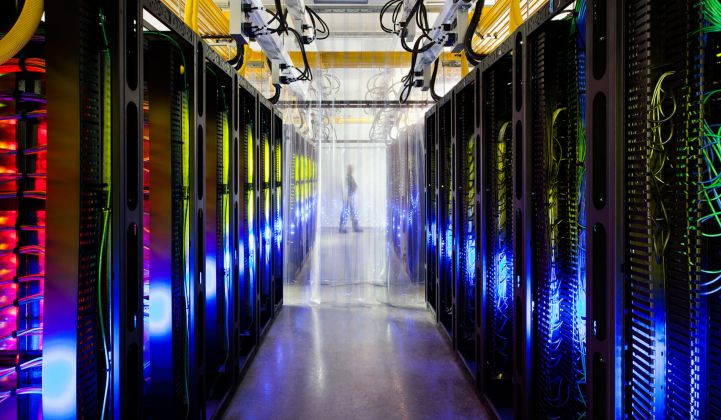SAN FRANCISCO, Calif. — Utilities, not green-minded corporations, need to lead on decarbonizing the grid, said executives at Google and Facebook.
Corporate procurement now ranks among the top drivers of large-scale U.S. renewables purchases. But it's not the long-term answer to clean energy deployment, the technology executives said Thursday, speaking at an event hosted by the American Council on Renewable Energy. They'd rather see large market shifts than an emphasis on voluntary corporate renewables goals.
Google and Facebook are currently the nation's largest corporate buyers of renewable power in 2019 and also rank among the largest in the world.
Facebook has announced seven U.S. deals so far in 2019, according to reporting by the Renewable Energy Buyers Alliance (REBA), a group that helps companies buy clean energy. In September, Google unveiled plans for 1.6 gigawatts in global renewables procurements — which it claimed was the single-largest corporate renewables purchase ever — plus a $500,000 investment in REBA.
But the technology companies admitted those types of commitments aren’t enough to fully decarbonize the grid or to encourage more of their peers to join up with their efforts.
“What we’ve been doing we’re very proud of, but it’s not necessarily the scale or the answer long-term,” said Robert Parker, Google’s senior lead of data center energy and location strategy. “We’re not a utility; we’re not a power company.”
Peter Freed, Facebook’s head of energy strategy, echoed those thoughts, calling for “structural changes to markets” and decarbonization of entire utilities to spur more corporate buyers to get in line.
Big tech's heavy green influence
Big technology companies looking to power their operations with renewables have become a powerful voice in pushing utilities toward cleaner energy mixes.
In Virginia, for instance, utility Dominion Energy has faced blowback from companies such as Amazon, Adobe and eBay about its reliance on natural gas. Several companies have penned letters criticizing the utility’s recent integrated resource plans and calling for more renewables. Walmart, Costco and others have worked to leave the utility’s service territory altogether in search of more renewables, though state regulators have so far rejected those attempts.
Google and Facebook did not sign those letters, neither has exited a U.S. utility, and both have largely steered clear of the more public squabbles over utility service. But both companies expressed interest in pushing utilities — which Freed said “are in the best place to serve customers” like Facebook — to do more.
Google, according to Parker, recently became a member of the Midcontinent Independent System Operator and the Southwest Power Pool and is increasingly getting involved on the local level with public utility commissions.
“Ten years ago, nobody was offering us renewable energy, so we signed [power-purchase agreements],” said Parker. “Our goal is to decarbonize the grid. If our utilities will offer us products that we’re looking for on a cost-effective basis, then that helps everybody.”
Though Freed said that Facebook has “managed to figure out a system that works for us with every utility partner that we work with,” both companies have also had to do a lot of their own legwork to meet renewables targets.
“When we first came into the market, there were no products that worked for us, or very few,” said Freed. “And so we started to have to do things ourselves.”
“We've done a huge amount of work with regulated utilities, really trying to partner with them to figure out how we can use their existing toolbox to put together rate structures that allow individual companies to serve load with 100 percent renewable energy while making sure that we insulate other customers from the costs of doing so.”
Facebook worked with Dominion on developing its own rate, the Schedule RF tariff, and its demand encouraged the utility to join up on hundreds of megawatts of solar development. The company also recently invested directly in a renewables project for the first time. Google has pledged to invest in renewables near manufacturing centers to clean up its hardware production. Both companies have plans for 100 percent renewables. While Google has already achieved that goal, Facebook said it plans to meet the target by 2020.
Criticism from within their own ranks
But concurrent with these companies applying pressure on utility partners, they’re garnering criticism from some employees and environmental advocates who say they’re not doing enough to act on climate change. In September, tech workers walked off the job to protest their employer’s environmental policies, such as ties to fossil fuel companies and outsize carbon footprints.
“The employee activism around this issue has...grown incredibly, especially over the last year and a half,” said Susan Mac Cormac, a corporate partner at Morrison & Foerster, while leading the discussion with Google and Facebook at the event. “Interestingly, they’re not even just saying, 'Look at your emissions,' but they’re saying, ‘What are you doing as a company that is furthering big oil and gas and their emissions?’”
Despite significant renewables commitments, tech companies haven’t completely answered those employee complaints. Onstage, both Google and Facebook said they believe in pursuing climate action and drawing down the carbon impact of their electricity usage, while pushing the larger system to do the same.
“We believe in fighting climate change,” said Freed. “To do the amount of renewable procurement that we have done as our data center portfolio has increased at a tremendous rate has been a ton of work. And so sometimes we find ourselves in these conversations where we’re talking about the next 10 years, and we’re not even at 100 percent yet. There’s a ton of work left to do there, and we will continue to do that work.”
“But beyond that, we are thinking and talking a lot about where we go in terms of helping to push the electricity system forward.”




